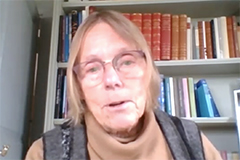ODA, Japan and Europe in the Post-COVID World: A Dialogue With Distinguished Fellow Marie Söderberg
2020.12.15
Nikolay Murashkin, research fellow at the JICA Ogata Sadako Research Institute for Peace and Development (JICA Ogata Research Institute), interviewed the Institute’s Distinguished Fellow Marie Söderberg via Zoom about Japan, ODA and the Institute in the post-coronavirus world.
Marie Söderberg is director of the European Institute of Japanese Studies, Stockholm School of Economics, in Sweden. She studied under Ogata Sadako at Sophia University in Tokyo in the early 1980’s.
(The interview has been condensed and edited for clarity.)
Murashkin: What issues and what changes and continuities are crucial in the international relations that are shaped by countries’ different policy responses to COVID-19?
Söderberg: Multilateralism is important for the future and for combating COVID-19. No one can combat COVID-19 alone. Pandemics must be addressed through multilateral organizations such as the United Nations and the World Health Organization. Health issues are becoming more prominent in international relations and development cooperation. Multilateral trust is crucial, and it is important to listen to recipient countries regarding their needs. Development cooperation is particularly important because poverty is increasing amid the pandemic, creating a backlash in Sweden, and flexibility is needed to be able to assist in these times. In recent years, Sweden has had 2,000 interventions in the development field, most of which have been re-evaluated and changed to cope with COVID-19. The increase in poverty also highlights a renewed need for humanitarian assistance. The UN’s World Food Program received the Nobel Peace Prize this year, showing the importance of humanitarian work. The Trump administration showed how trust in institutions can decrease in a few years, as seen in the U.S. withdrawal from the Paris Climate Accord and the Iran nuclear deal. Trust and consistency in international relations are important.

Marie Söderberg, distinguished fellow at the JICA Ogata Research Institute
Murashkin: What can Japan’s contribution be in the post-COVID-19 world?
Söderberg: The health sector is a strength of Japanese development cooperation and Japan’s work in the sector should continue. Expectations are high for Japan in Southeast Asia in particular, where the country has been aiding since the 1970s and can take a leadership role. Myanmar, Vietnam, Indonesia and the Philippines are examples of countries where there is a need for Japan’s expertise. Japan’s years of work on flood control in Manila played a key role during the recent typhoon in the Philippines. Japan also can be a role model around the world on health and infrastructure such as power lines, harbors, airports, roads and rail.
Murashkin: COVID-19 greatly affected the movement of people and goods via these infrastructures, and perhaps this effect can be offset somewhat using digital communication.
Söderberg: Japan and the EU can help countries become connected digitally. Digital connectivity will help, for example, with providing surveys about vaccine needs and in distributing vaccines.
Murashkin: What opportunities would you highlight for cooperation between Sweden, the EU and Japan as like-minded polities that attach particular importance to the values of freedom and democracy?
Söderberg: As part of the Strategic Partnership Agreement concluded in 2018 between the EU and Japan, there is a Sustainable Connectivity and Quality Infrastructure Agreement. The partners planned to physically visit countries together to investigate opportunities for collaboration on connectivity, including in Central Asia, Eastern Europe and Africa. The missions have been postponed because of COVID-19, but I am confident they will take place. This is the first step. Public-private partnerships, which Japan has pioneered, are a clear trend in Europe, too, that helps not only recipient countries but also donor-country companies. Japan and Europe, with their shared values, can be an alternative to the Chinese Belt and Road Project. I hope the U.S. will also return to multilateralism. The EU and Japan can also work together on green energy, which is part of their strategic partnership.

Nikolay Murashkin, research fellow at the JICA Ogata Research Institute
Murashkin: On that topic, Prime Minister Suga Yoshihide has set a goal to cut Japan’s CO2 emissions to net zero by 2050.
Soderberg: Japan and Europe are both working to convert to renewable energy, and there is public support for fighting climate change, which may be linked to pandemics and natural disasters. Japan has participated in the EU’s Common Security and Defense Policy (CSDP) civil missions, for example, a mission for assisting civil society in Afghanistan, and this is an area in which more cooperation is possible. When COVID-19 emerged in March 2020, I had the idea of using the defense personnel to send field hospitals to developing countries. We could do it together, the EU and Japan.
Murashkin: What kind of role can researchers and research institutions have in the present circumstances?
Söderberg: Sustainable systems must be created to mitigate pandemics, and researchers can help teach developing
countries how to create sustainable systems, so they are not too heavily affected. Also, researchers in Japan and Europe could partner with peers in developing countries on joint research and gather empirical evidence to improve the way development cooperation is carried out. The EU and Japan’s joint work on disaster prevention and recovery could be built up to cover pandemics as well. We must think long term all the time.

事業事前評価表(地球規模課題対応国際科学技術協力(SATREPS)).国際協力機構 地球環境部 . 防災第一チーム. 1.案件名.国 名: フィリピン共和国.

事業事前評価表(地球規模課題対応国際科学技術協力(SATREPS)).国際協力機構 地球環境部 . 防災第一チーム. 1.案件名.国 名: フィリピン共和国.

事業事前評価表(地球規模課題対応国際科学技術協力(SATREPS)).国際協力機構 地球環境部 . 防災第一チーム. 1.案件名.国 名: フィリピン共和国.

事業事前評価表(地球規模課題対応国際科学技術協力(SATREPS)).国際協力機構 地球環境部 . 防災第一チーム. 1.案件名.国 名: フィリピン共和国.

事業事前評価表(地球規模課題対応国際科学技術協力(SATREPS)).国際協力機構 地球環境部 . 防災第一チーム. 1.案件名.国 名: フィリピン共和国.
scroll